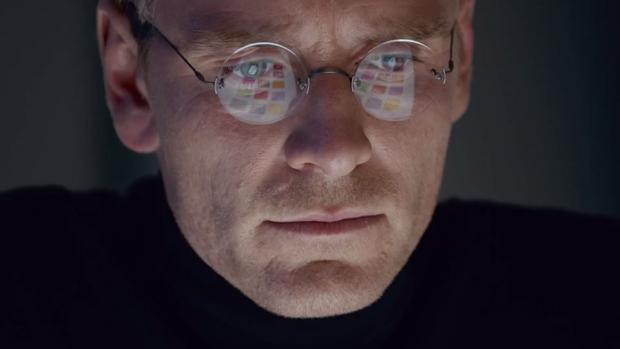A Genius and a Jerk: STEVE JOBS
Okay, so Steve Jobs, the new movie about the Apple computer magnate and innovator, isn’t a biopic. We have this assurance from Aaron Sorkin (The Social Network) who wrote it. He and the movie have taken some flack over the last several weeks for alleged serious departures from reality. To which complaints Sorkin—and it’s he, not director Danny Boyle, who has mounted the primary defense—says focusing on facts is misguided and rather beside the point since Steve Jobs isn’t intended as biography. The filmmakers, he says, were trying to achieve something truer than a biopic could provide. And that would be what? That’s apparently hard to say. Something “impressionistic” Sorkin has offered.
Steve Jobs’ creators have certainly eschewed conventional biopic construction, though not as completely as they seem to think. (There are frequent flashbacks of life-story glimpses.) The movie really resembles a modestly opened-out adaptation of a three-act play. It’s composed of three historical segments, each centering on the launching of one of the computers associated with Jobs: The Macintosh in 1984; the NeXT cube in 1988 and, of course, the iMac in 1998. And each of these “backstage” depictions of the launches shows Jobs (Michael Fassbender, working as well as anyone could) beset with major glitches; the last-minute disagreements of employees and associates, and various logistical challenges, even as he insolently and ruthlessly forges ahead, riding roughshod over objections.
These events are also fraught with personal trials, the most important being the troubling result of his ragged relationship with ex-girlfriend Chrisann Brennan (Katherine Waterston) and her daughter Lisa (portrayed by three different progressively older actresses), whom Jobs notoriously repudiated even after a court ruled against him. This tragically unhappy tug-of-war is a major basis for the movie’s purported insights into its subject’s personality. Jobs’ reactions to mother and daughter’s (highly unlikely) visits at these product launches evolve from sharp resentment to an eventual poignant need for his angry daughter’s presence at the ’98 launch.
Sorkin and Boyle tell their tripartite story in emotionally charged sequences of escalating conflict, caused and presided over by Jobs’ overbearing insistence on things being done exactly according to his vision. One may doubt the authenticity of the pointedly insensitive, caustically articulate dismissal of others’ concerns that the movie presents, and a lot of it has been disputed. The New York Times columnist Joe Nocera, who knew Jobs, calls this version “fiction.” The New York Post’s Kyle Smith said the film should be called iLied. Its Jobs is probably more impressively caustic and insightful than the real one, for good or ill.
But it’s not a biopic, says Sorkin. He seems to be arguing for art’s privilege over mere fact, saying that art reaches truths that careful documentation can’t. It’s an old, recurring argument, and I mention it because I think it’s inevitable that many who see this movie will buy into this portrait. And because Sorkin seems to be claiming an artistic exemption curiously similar to one Jobs seemed to feel entitled to. The advertised beauty and practical appeal of Apple products were an important part of Jobs’ implicit rationale for his behavior and power. The movie endorses this rationale, and seems to be applying it to itself: It’s not cheating, it’s pushing a vision. Maybe, or maybe not.
One of the aspects of this story the film doesn’t touch on is how ordinary a world-class capitalist Jobs really was: He advised President Obama to lower corporate taxes and let companies keep their overseas profits without taxes or penalties. He was evidently indifferent to severely exploited workers at Apple’s foreign contractors. Standard-issue One Percent stuff.
This film wants to concentrate on the interpersonal sturm and drang and imputed mellowing and self-examination of the man. At the very end, he’s triumphantly seen in gauzy, backlit imagery, smiling at Lisa. He’s less persuasive than the younger, more monstrous genius.

